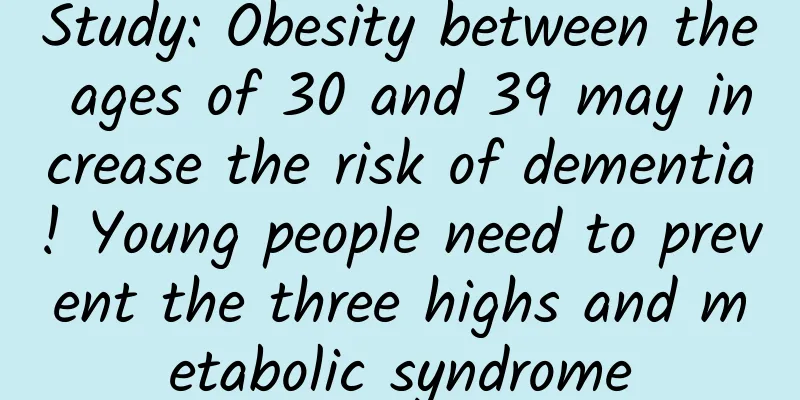Study: Obesity between the ages of 30 and 39 may increase the risk of dementia! Young people need to prevent the three highs and metabolic syndrome

|
Everyone stays away from obesity. Besides the fact that a fat body looks unattractive, the three high diseases caused by obesity are even more of a health killer. As people age, their metabolic rate decreases, and gaining weight in middle age has become a nightmare for many people. But be careful, the latest research from the University of Oxford in the UK shows that if you gain weight in your 30s (30-39 years old), your risk of developing dementia later in life is the highest in your lifetime, and can even be three times higher than other age groups. The Daily Mail quoted a study from Oxford University as saying that the risk of obese people developing dementia is related to the age at which their body size reaches the obesity standard. The 30s generation can be said to be a hurdle. If you become obese in your 30s, your risk of developing dementia in the future is three times higher than that of people in other age groups. After the age of 40, the older you are when you are overweight, the lower your risk of developing dementia. The risk of developing dementia in obese people is related to the age at which their body size reaches the obesity standard. The 30s are a critical period. If you become obese in your 30s, your risk of developing dementia is three times higher than that of people in other age groups. People who gain weight in their 30s are at the highest risk of dementiaResearch by scholars from Oxford University shows that the age at which one reaches obesity is related to the risk of dementia. Gaining weight in middle age may accelerate the deterioration of memory and other brain functions. If weight is out of control in your 30s, the risk of developing dementia in the future will increase by 3 times, making you the group with the highest risk of developing dementia. The study pointed out that the older the age when obesity is diagnosed, the lower the risk of dementia. For people who gain weight at the age of 40, the excess risk of developing dementia drops to 70%. When the age reaches 50, the excess risk drops to 50%. For people who gain weight after age 60, the extra risk is 40%. If obesity is diagnosed after the age of 70, the excess risk of dementia is no different from that of the general population. The researchers followed more than 450,000 patients who were diagnosed with obesity in British hospitals between 1999 and 2011. The research has been published in the Postgraduate Medical Journal. Atherosclerosis, hypertension, and risk factors for dementiaThe Daily Mail reported that this study did not explain why the age of obesity would affect the risk of dementia, but arteriosclerosis and high blood pressure caused by obesity have long been considered risk factors for dementia. Previous studies have also shown that abdominal obesity has a negative impact on brain function, possibly because abdominal fat is more metabolically active and releases more acids that increase the risk of cardiovascular disease. In addition, the common high blood pressure and high blood sugar problems in obese people are also negative factors. Previous studies have also shown that abdominal obesity has a negative impact on brain function, possibly because abdominal fat is more metabolically active and releases more acids that increase the risk of cardiovascular disease. In addition, the common high blood pressure and high blood sugar problems in obese people are also negative factors. Dr. Eric Karran, director of the UK Alzheimer's Disease Research Center, pointed out that the limitation of this study by Oxford University is that the data of obese people in the study came from hospitals, and it is difficult to measure the probability of dementia in those who are also obese but have not sought medical treatment. Dr Clare Walton, of the Alzheimer's Society, said that while the findings were striking, the data was limited and it was too early to draw any conclusions. However, since more and more studies show that being overweight in middle age increases the risk of developing dementia than gaining weight in later life, it is never too late for anyone to start changing their bad lifestyle habits now. Doctors: Obesity, inactivity, and lack of brain power are factors of dementiaNeurologist Zhen Ruixing pointed out that although this study is still a relative statistical data, the inference is acceptable from a medical perspective, because the factors that cause dementia include obesity, lack of exercise, lack of brain activity, and patients with the three highs (high blood pressure, high blood lipids, and high blood sugar) and metabolic syndrome; and people who become obese at a young age are mostly due to lack of exercise or overeating, which can easily lead to the three highs and metabolic syndrome in the long run, naturally increasing the risk of developing dementia in the future. |
Recommend
What is the hcg value for ectopic pregnancy? More than 6000
Ectopic pregnancy is a very dangerous pregnancy. ...
What should you not eat after an abortion? 12 kinds of vegetables that are forbidden to eat after an abortion
What can't you eat after an abortion? 12 kind...
Male weighing 207 kg and diabetic gastric bypass weight loss
A 24-year-old man in Kaohsiung City, weighing 207...
How to regulate irregular menstruation and affect pregnancy
Irregular menstruation is actually menstrual diso...
At what age do uterine fibroids usually occur? At what age are uterine fibroids most likely to occur?
At what age do uterine fibroids usually occur? At...
Is it useful to take soy isoflavones for irregular menstruation?
Eating soy isoflavones may have a certain effect ...
How to treat cervical erosion? 4 best treatments for cervical erosion
Now many women do not know what kind of treatment...
Eating hot pot this way won’t make you fat! Nutritionist teaches 4 tricks to fix it
In the chilly winter, it is a happy thing to get ...
What should you pay attention to after painless abortion?
What should you pay attention to after painless a...
How much do you know about eating out and eating side dishes at noodle stalls to lose weight?
How to eat when it comes to losing weight? Noodle...
Cost of surgery for dysfunctional uterine bleeding
Functional uterine bleeding can cause a lot of ha...
Uterine fibroids, abdominal distension and pain, what medicine to take, uterine fibroids, lower abdominal distension and pain, what to eat
Uterine fibroids are one of the common benign tum...
How much does intrauterine adhesion surgery cost?
How much is the cost of treating intrauterine adh...
Chinese medicine prescription for treating amenorrhea in adolescence
Adolescent amenorrhea can be treated with Chinese...
Mechanical stimulation is the main cause of cervicitis
Cervicitis is a common disease among women of chi...









